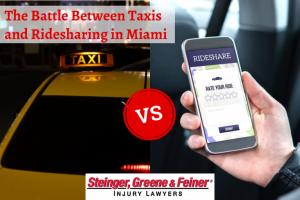
Across the country, ridesharing services like Uber and Lyft have been slowly but steadily edging out taxis as an alternative way to get around town. Until 2016, Miami-Dade County outright banned ridesharing services.
Then, after much deliberation, government officials decided that the business model of using private contractors and fluctuating prices was legal, and ridesharing companies flocked to South Florida. This was a potentially fatal blow to the taxi industry, as their prices are heavily regulated by state and local governments.
A lawsuit was filed after the decision on behalf of the taxi industry, and after a year-long battle, a decision has been made: Uber and Lyft are here to stay.
As Miami car accident lawyers, we’ve followed these developments closely over the years. We know there are some benefits of ridesharing services, but when wrecks happen, passengers are often left out to dry. We encourage anyone who has been injured in an accident involving a taxi or a rideshare to call us today for a free consultation.
A JUSTIFIED LAWSUIT?
Many Miami locals saw the $1 billion lawsuit as the final breath of a dying industry. After all, calling a taxi and waiting around for it to arrive is much less convenient than simply opening an app and getting the nearest local rideshare driver. However, when the details of the lawsuit are more thoroughly examined, it may seem that the taxi industry had a very valid case against the Miami-Dade government.
Part of the business model for Uber and Lyft is a process called “surge pricing.” Essentially, the companies raise and lower their prices in real time, depending on demand. For holidays like New Year’s Eve, there have been reports of drivers paying over $80 for a five-minute ride.
Taxi companies, on the other hand, are restricted on how high they can raise their prices due to county rules. While this may seem beneficial for taxi companies — after all, they provide cheaper rides — they still make less money than ridesharing services due to restricted pricing.
The other main issue is one that has been part of lawsuits across the country: taxi medallions. Cab drivers have to pay for special licensing in order to operate their vehicles. Usually, these medallions go for about $20,000 a pop, while they sometimes are auctioned off for as much as $400,000 or more. Uber and Lyft drivers don’t have to have any kind of licensing, and with the crumbling of the taxi industry, that sunk cost likely won’t be recovered.
With these factors in mind, the $1 billion sought by the taxi industry isn’t so outlandish. It would have covered the lost income due to the influx of Uber and Lyft, while also helping recover the sunken cost of taxi medallions.
Are Uber and Lyft More Beneficial Than Taxis?
When it comes to ridesharing services, one of the biggest questions is if they’re effective in the fight against drunk driving. While there are plenty of competing studies that give different answers, one study looked directly at DUI and other crime rates once ridesharing was introduced into a region.
What they found was underwhelming, to say the least. The introduction of Uber and Lyft did, in fact, lead to a decrease in drunk driving. However, the evidence that ridesharing is responsible for this decline is weak; there were any number of factors that could’ve had a more significant impact.
What ridesharing did do, however, is lower the rate of fatal car accidents. Up to three years after ridesharing is introduced, fatal accidents drop by over 2 percent. In the first year alone, the rate of fatal wrecks drops by 3 percent.
While there isn’t as much evidence or data available for DUI and fatal accidents in areas with taxis, the ease of use of ridesharing apps likely has a greater impact than taxis. After all, these areas in which Uber and Lyft were introduced likely had some form of taxi service available.
WHAT’S REALLY BETTER FOR MIAMI LOCALS?
On the surface, it seems that ridesharing services are better for the average rider. It’s more convenient and, when there is not much demand, prices are way lower than a taxi. But initial price is not the only factor. For instance, what happens if you get in a wreck? Taxi drivers have a set procedure to follow and proper insurance to cover any injuries, but with ridesharing, it may be a gamble.
Uber and Lyft do have policies to make sure any passenger in a wreck is compensated for medical bills and other expenses. In fact, Uber boasts a $1 million insurance coverage in the event of an accident However, it can be nearly impossible to actually see any of that money. There are many exceptions built into Uber’s insurance policy, and unless every criteria is met, you may be stuck trying to get compensation from the driver’s personal insurance company instead.
Cities like Miami have built their tourism industry on the back of taxi drivers. Though it may disheartening to see the local government give such preferential treatment to outsiders like Lyft and Uber, the market itself may have a say in how long they survive in the city.
Thanks to a storied history of driving locals and tourists alike around the city, and its much more professional drivers and policies, the taxi industry may be on the upswing again soon. After all, who knows the best spots in Miami better than the professionals who have driven the city for years?
Talk to a Miami Car Accident Lawyer Today
Whether you’ve been injured in an accident involving a taxi or a ridesharing service, you have legal options. At Steinger, Greene & Feiner, our Miami car accident attorneys have helped recover millions on behalf of our clients.
Give us a call today at 800-560-5059 or contact us online for a free, no-obligation consultation. Our lawyers are here to take your call 24/7, because justice never sleeps.
